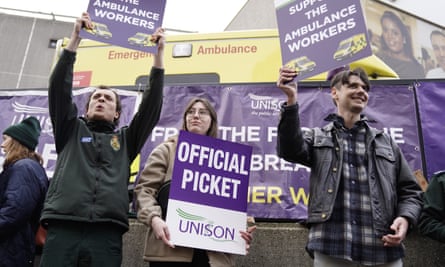NHS strikes could continue for many months amid anger at UK government plans to raise staff salaries by only 2% next year, which health unions have condemned as more “real-terms pay cut misery”.
Ministers have asked the NHS pay review body to cap the increase in frontline health workers’ pay to 2% in 2023-24 to help the government achieve its ambition to curb soaring inflation.
But the attempt by the health secretary, Steve Barclay, to cap the annual salary rise at such a low level could lead to the NHS facing prolonged industrial action, health service bosses are warning. The 2% is barely a third of the estimate by the Office for Budget Responsibility (OBR) that inflation as measured by the CPI index will average 5.5% during 2023-24.
The 2% plan comes against a background of widespread strikes across the NHS in protest at the government’s decision to give the bulk of personnel a rise of £1,400 – or about 4% – for 2022-23. In England, ambulance staff will walk out again on 11 and 23 January, while nurses are due to refuse to work on 18 and 19 January, disrupting a wide range of services including planned surgery and outpatient appointments.
On 16 November, Barclay wrote to the NHS pay review body, which advises ministers what size of uplift staff apart from doctors and dentists should receive, giving them their remit for the 2023-24 settlement. While it did not specify the 2% figure, the NHS Confederation hospitals body, the Health Foundation thinktank and several health unions all say that the fact that NHS England’s budget for 2023-24 has already been set means that is the sum Barclay is keen to see awarded, with a 1% contingency potentially making it a 3% rise. Either sum is likely to provoke further unrest among NHS staff.
Pat Cullen, the general secretary of the Royal College of Nursing (RCN), said: “Our dispute is about the NHS pay award for 2022-23, and we are deciding how to engage in discussions about the 2023-24 award. Ministers need to resolve our dispute with them over this year’s award before they move on to next year’s.”
But in a direct response to the mooted 2% rise, she added: “Inflicting a decade of real-terms pay cut misery on nursing should be more than enough without considering going down that road again next year.”
Matthew Taylor, the NHS Confederation’s chief executive, urged Barclay not to try to impose such a small, below-inflation increase for a second year running.
“The trade unions are calling for a pay rise for NHS staff that is above current levels of inflation, which 2% to 3% would not deliver. If the government wants to avoid the prospect of prolonged industrial action this year, it must be prepared to negotiate on pay and both sides must be willing to compromise,” Taylor said.
Anita Charlesworth, the director of research at the Health Foundation, said: “The NHS’s budget for next year was set by the government on the basis that health service staff would receive a 2% uplift in the coming pay round. This would be less than half forecast inflation and below the [OBR’s] official forecast for earnings growth across the economy, which is 3.5%.”
A 2% award would risk exacerbating the NHS’s deepening staffing crisis, she added. “The result would be that NHS workers would face a further cut in real earnings. At a time of rising vacancies, it would mean NHS wages falling further behind other sectors, with risks to recruitment and retention.”
In his letter to Philippa Hird, the chair of the NHS pay review body, Barclay reminded her that “the NHS budget has already been set until 2024 to 2025”.
He said: “Pay awards must strike a careful balance – recognising the vital importance of public-sector workers while delivering value for the taxpayer, considering private-sector pay levels, not increasing the country’s debt further, and being careful not to drive prices even higher in the future.”

And in advice that underpins the likely 2% offer, the health secretary added: “In the current economic context, it is particularly important that you also have regard to the government’s inflation target when forming recommendations.”
NHS England cannot easily increase the 2%. It is under pressure to use its budget to tackle the 7.2 million-strong backlog of people awaiting hospital care, and the intense strain the entire service is under. That, allied to the fact that “NHS spending is planned to increase by a historically low level next year”, means that it has “little or no headroom to fund additional pay costs [beyond the 2%], with the government holding a potential contingency for a further 1% increase”, Charlesworth said.
An official at the GMB union said: “The Department [of Health and Social Care] has already sent its remit to the pay review body for next year and budgeted for a 2.1% pay increase. This is about a third of forecast inflation in 2023. The fundamental issue in the dispute is that NHS pay settlements have continuously been too low.”
However, Rishi Sunak and Jeremy Hunt, the chancellor, have ruled out increasing this year’s £1,400 offer because they are keen to demonstrate restraint over public-sector pay to help the Conservatives regain a reputation for economic competence.
Hunt has ruled out a one-off extra payment to nurses to try to end the government’s increasingly bitter standoff with the RCN, even though such a move is popular with voters.
The Department of Health and Social Care said it had not yet decided what pay rise for NHS staff for 2023-24 it could afford. “The government hugely values and appreciates NHS staff and we have committed to give NHS workers a pay rise, asking the independent pay review bodies for recommendations on pay for staff in scope,” a DHSC spokesperson said.
“This follows the acceptance of last year’s recommendations in full, which saw the lowest earners in the NHS receive a 9.3% pay rise.
“We will consider the independent pay review bodies reports carefully when we receive them. The government has not yet set out the position on affordability for 2023/24.”












